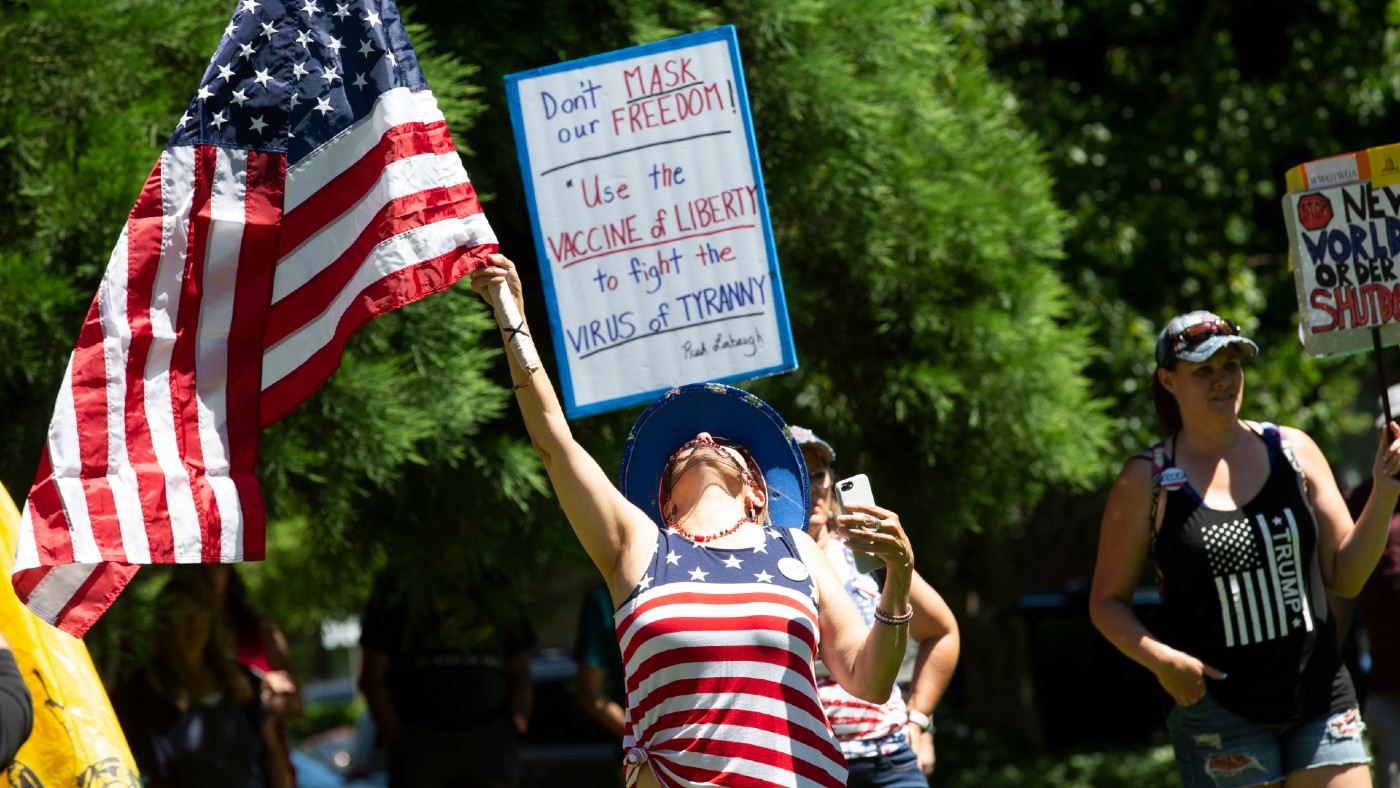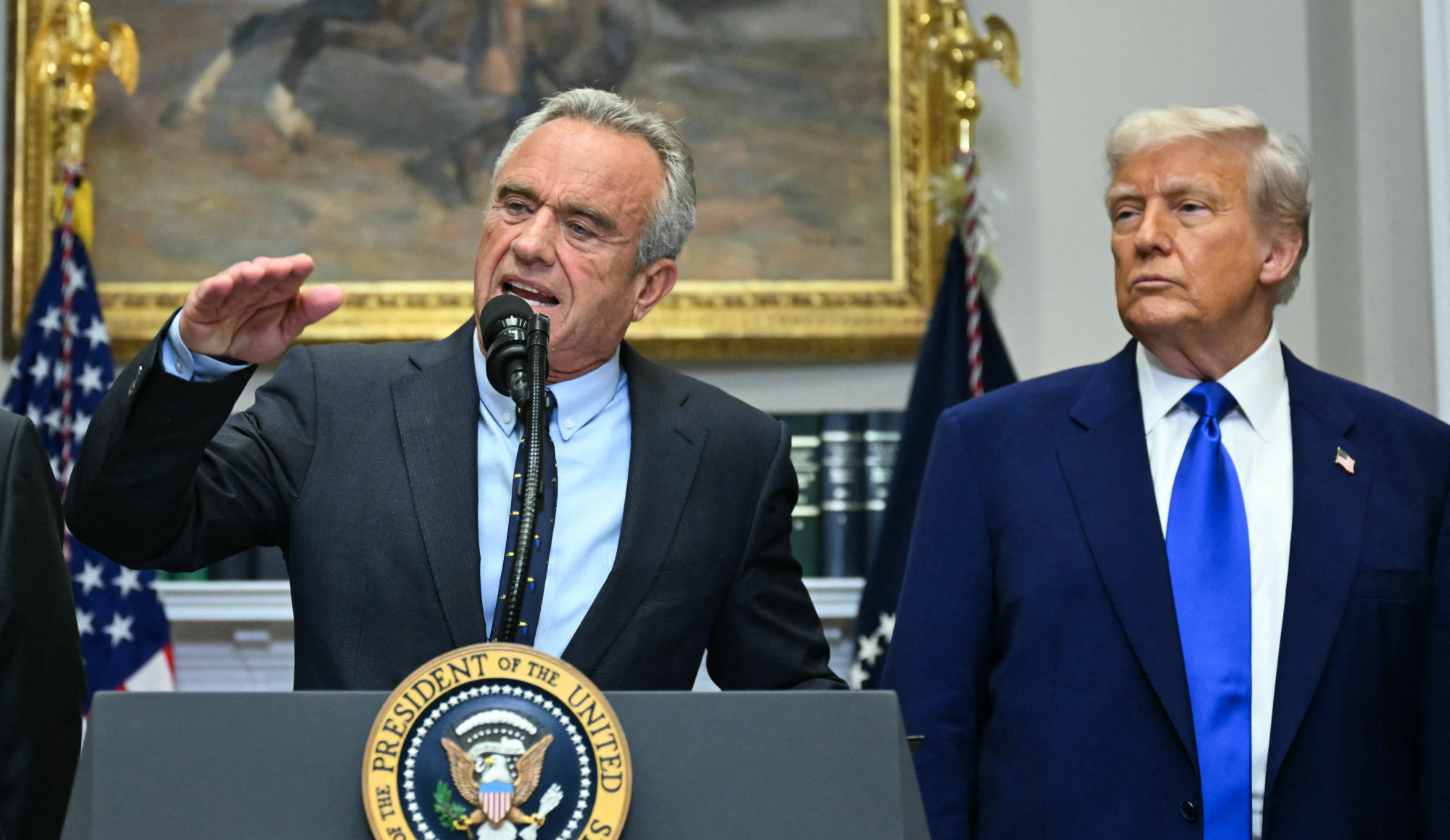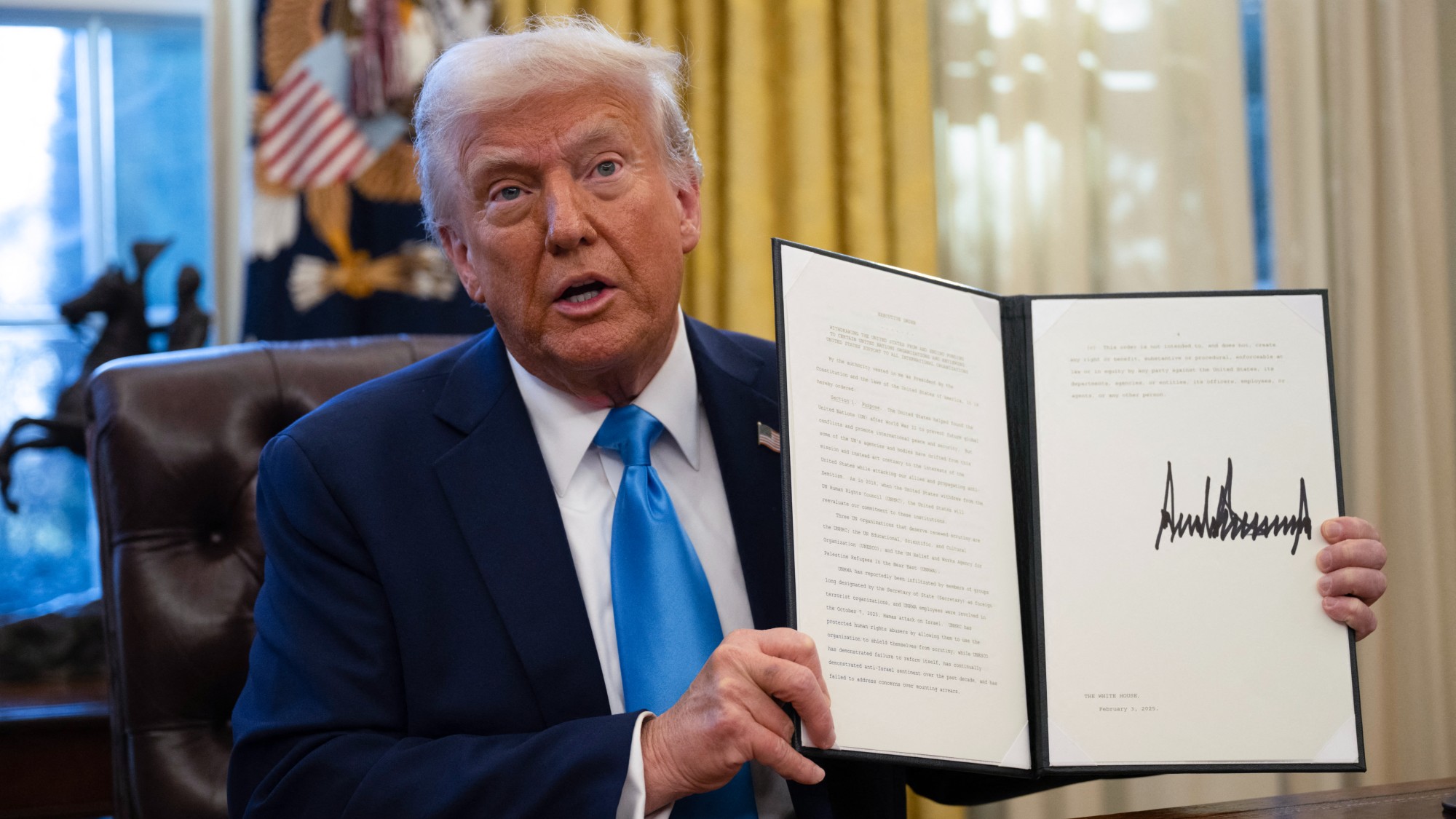Coronavirus: how face masks became a political symbol in the US
Poll finds that 65% of Democrats wear face coverings compared with 35% of Republicans

A free daily email with the biggest news stories of the day – and the best features from TheWeek.com
You are now subscribed
Your newsletter sign-up was successful
Donald Trump has insisted that he would have “no problem” wearing a face mask in public - a dramatic U-turn from his previous refusal to be photographed in the PPE essential despite the coronavirus pandemic.
“I’m all for masks. I think masks are good,” the US president told the Fox Business Network during an interview on Wednesday. “Actually, I had a mask on and I sort of liked the way I looked,” he said.
The statement marks a departure from his previous pronouncements on face coverings. At a news conference in late May, Trump criticised a Reuters journalist for wearing a mask and accused the reporter of wanting to be “politically correct”.
The Week
Escape your echo chamber. Get the facts behind the news, plus analysis from multiple perspectives.

Sign up for The Week's Free Newsletters
From our morning news briefing to a weekly Good News Newsletter, get the best of The Week delivered directly to your inbox.
From our morning news briefing to a weekly Good News Newsletter, get the best of The Week delivered directly to your inbox.
How did masks become a political symbol in the US?
Mask-wearing laws in the US vary by state and city, but critics of the practice are to be found all over the country.
Protesters have marched on the Texas State Capitol in Austin chanting slogans about “medical tyranny”, while lawsuits filed in Florida courts have argued that mask laws violate people’s constitutional rights.
Resistance to mask-wearing in the US is largely a conservative position, however.
A free daily email with the biggest news stories of the day – and the best features from TheWeek.com
An Axios-Ipsos poll published last week found that 65% of Democrats wore masks, compared with 35% of Republicans.
The president and other high-profile politicians have “become examples of the divide”, says Business Insider. Trump and his vice president, Mike Pence, have refused to wear masks in public on several occasions.
Trump has also mocked Joe Biden for wearing a mask, with the Democratic presidential nominee in turn labelling the president a “fool” for his “falsely masculine” behaviour.
State authorities are generally split along partisan lines over the issue as well.
Many governors in southern, conservative states have shied away from issuing statewide mandates on wearing masks in public.
“We want to make sure that individual liberty is not infringed upon by government, and hence government cannot require individuals to wear a mask,” Greg Abbott, the Republican governor of Texas, said last month.
Democratic governors, meanwhile, are tending to mandate, or at least issue advice supporting, the wearing of masks in public.
California’s Democratic Governor Gavin Newsom made mask-wearing in public mandatory across the state on 18 June, saying that “science shows that face coverings and masks work. They are critical to keeping those who are around you safe, keeping businesses open and restarting our economy.”
The situation in the US now is similar to what happened during the outbreak of the Spanish flu in 1918, when many Americans tried to mount legal challenges over state services being closed, according to global health and law professor Polly Price of Emory University in Georgia.
“We do have a long tradition of individual rights, so even during the Spanish flu people would sue about the schools [being] closed. Or restaurants and bars were closed and people would sue about that and they routinely lost,” Price told the BBC.
Similarly, protesters today have argued that lockdowns infringe their civil rights. “The anti-mask rhetoric seems to come from the same well - American resistance to government mandates,” says the broadcaster.
–––––––––––––––––––––––––––––––For a round-up of the most important stories from around the world - and a concise, refreshing and balanced take on the week’s news agenda - try The Week magazine. Start your trial subscription today–––––––––––––––––––––––––––––––
What has led to Trump’s change of heart?
Republican leaders have recently begun to switch over to align themselves with Democrats’ position on masks.
Among those who have had a change of heart are Pence, who heads the US Covid-19 task force, Republican Senate leader Mitch McConnell, senator Mitt Romney and congresswoman Liz Cheney.
On Tuesday, Tennessee’s Republican Senator Lamar Alexander “bluntly called on Trump to start wearing a mask, at least some of the time, to set a good example”, the Houston Chronicle reports.
“Unfortunately, this simple, lifesaving practice has become part of a political debate that says ‘if you’re for Trump, you don’t wear a mask, if you’re against Trump, you do’,” Alexander said.
Conservative media has also changed in tone on the debate, in line with the growing scientific consensus on the benefits of wearing masks.
The US Centers for Disease Control and Prevention has advised that individuals should wear cloth face coverings in public in order to help prevent people infected with the Covid-19 coronavirus from passing it on to others.
A review of the findings of 172 studies that was published in The Lancet medical journal this week found that “face mask use could result in a large reduction in risk of infection”.
Masks or no masks, however, Trump insists the issue may soon be purely academic when it comes to Covid. The virus “will at some point just sort of disappear”, the president insisted during this week’s Fox interview.
Arion McNicoll is a freelance writer at The Week Digital and was previously the UK website’s editor. He has also held senior editorial roles at CNN, The Times and The Sunday Times. Along with his writing work, he co-hosts “Today in History with The Retrospectors”, Rethink Audio’s flagship daily podcast, and is a regular panellist (and occasional stand-in host) on “The Week Unwrapped”. He is also a judge for The Publisher Podcast Awards.
-
 Political cartoons for February 16
Political cartoons for February 16Cartoons Monday’s political cartoons include President's Day, a valentine from the Epstein files, and more
-
 Regent Hong Kong: a tranquil haven with a prime waterfront spot
Regent Hong Kong: a tranquil haven with a prime waterfront spotThe Week Recommends The trendy hotel recently underwent an extensive two-year revamp
-
 The problem with diagnosing profound autism
The problem with diagnosing profound autismThe Explainer Experts are reconsidering the idea of autism as a spectrum, which could impact diagnoses and policy making for the condition
-
 The stalled fight against HIV
The stalled fight against HIVThe Explainer Scientific advances offer hopes of a cure but ‘devastating’ foreign aid cuts leave countries battling Aids without funds
-
 Obesity drugs: Will Trump’s plan lower costs?
Obesity drugs: Will Trump’s plan lower costs?Feature Even $149 a month, the advertised price for a starting dose of a still-in-development GLP-1 pill on TrumpRx, will be too big a burden for the many Americans ‘struggling to afford groceries’
-
 Can TrumpRx really lower drug prices?
Can TrumpRx really lower drug prices?Today’s Big Question Pfizer’s deal with Trump sent drugmaker stocks higher
-
 The new Stratus Covid strain – and why it’s on the rise
The new Stratus Covid strain – and why it’s on the riseThe Explainer ‘No evidence’ new variant is more dangerous or that vaccines won’t work against it, say UK health experts
-
 Why are autism rates increasing?
Why are autism rates increasing?The Explainer Medical experts condemn Trump administration’s claim that paracetamol during pregnancy is linked to rising rates of neurodevelopmental disorder in US and UK
-
 Trump seeks to cut drug prices via executive order
Trump seeks to cut drug prices via executive orderspeed read The president's order tells pharmaceutical companies to lower prescription drug prices, but it will likely be thrown out by the courts
-
 How Trump's executive orders are threatening scientific research
How Trump's executive orders are threatening scientific researchIn the spotlight Agencies are purging important health information
-
 Mar-a-Lago face: has Maga plastic surgery trend peaked?
Mar-a-Lago face: has Maga plastic surgery trend peaked?Under the Radar The must-have look for Trump’s inner circle does not come easy – or cheap – but it may be starting to fall out of favour